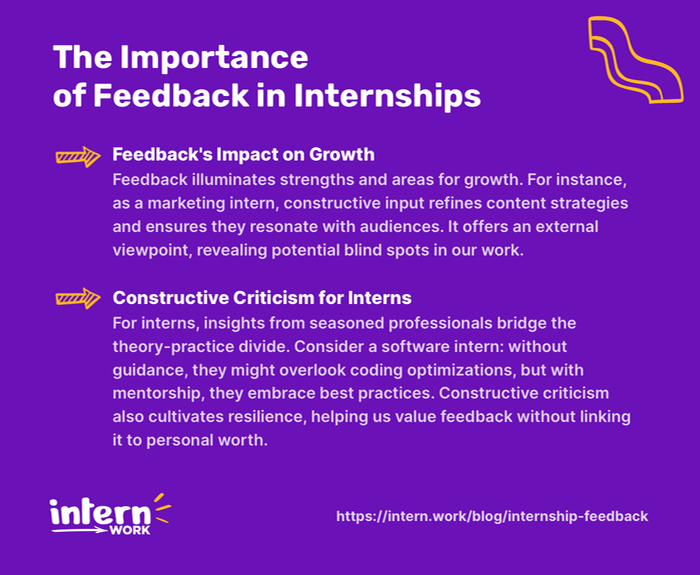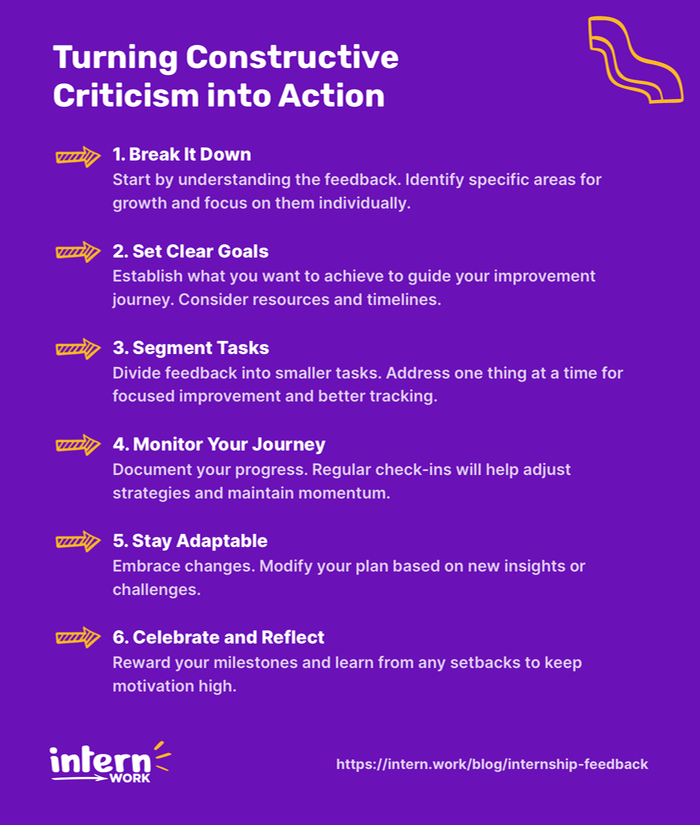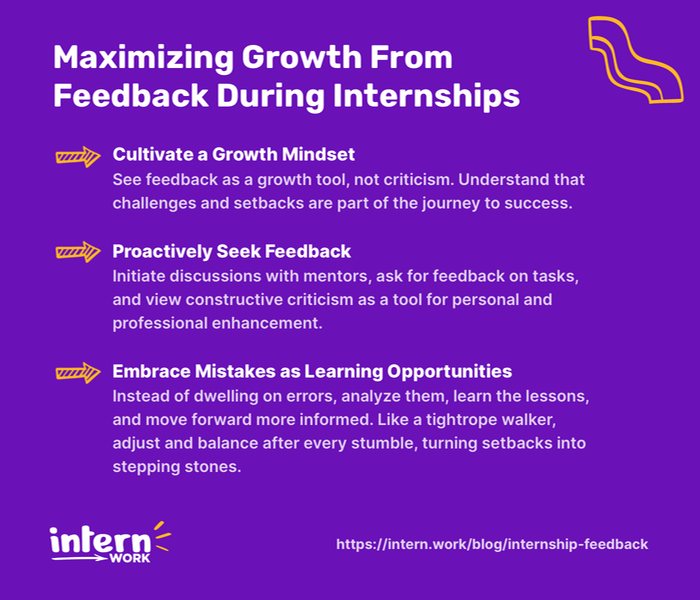
Being an intern can be an exciting yet challenging experience. It’s a time filled with growth, learning, and self-discovery. Along this journey, one inevitable aspect that interns must face is feedback – constructive criticism that is designed to help us improve and develop our skills. In this article, we will explore the importance of feedback in internships, the art of receiving feedback, turning constructive criticism into action, its positive impact on the internship experience, case studies of success stories, and tips for embracing feedback during your internship.
Understanding the Importance of Feedback in Internships
Feedback is like a compass that guides us on our path to professional growth. It provides invaluable insights into our strengths and weaknesses, helping us navigate the intricate world of internships.
As interns, we are constantly seeking ways to enhance our skills and make a meaningful impact in our chosen field. Feedback plays a crucial role in this journey, acting as a catalyst for personal and professional development.
But why is feedback so essential to our development as interns?
The Role of Feedback in Professional Growth
Feedback acts as a catalyst for personal and professional development. It helps us identify areas where we excel and need improvement. By receiving feedback regularly, we gain a better understanding of our capabilities. We can channel our efforts toward honing our skills.
Imagine you are an intern at a marketing agency, responsible for creating social media content. Without feedback, you may continue producing content without knowing if it resonates with the target audience. However, with feedback from your supervisor, you can learn what works and what doesn’t, allowing you to refine your approach and create more impactful content.
Moreover, feedback provides us with a broader perspective. It allows us to see ourselves through the eyes of others and gain insights that we may have overlooked. This external viewpoint is invaluable, as it helps us identify blind spots and areas for improvement that we may have been unaware of.
Why Interns Need Constructive Criticism
As interns, we are in a unique position to learn from experienced professionals. Constructive criticism equips us with knowledge that goes beyond textbooks and helps bridge the gap between theory and practice. It opens doors to new perspectives and allows us to make the most of our time as interns.
Imagine you are interning at a software development company, working on a complex coding project. With constructive criticism, you may be able to identify areas where your code can be optimized or streamlined. However, with the guidance of experienced developers, you can learn best practices, improve your coding skills, and become a more proficient programmer.
Furthermore, constructive criticism fosters resilience and adaptability. It teaches us how to handle feedback gracefully, separating our personal worth from the evaluation of our work. This ability to receive feedback with an open mind is a valuable skill that will serve us well throughout our professional careers.
In conclusion, feedback is not just a form of evaluation; it is a powerful tool for growth and improvement. As interns, embracing feedback and actively seeking it out can significantly enhance our development, allowing us to become more skilled, knowledgeable, and confident professionals in our chosen fields.

Feedback is essential for interns’ growth and development. It helps identify strengths and areas for improvement, providing valuable insights and perspectives. Constructive criticism from experienced professionals enhances learning and builds resilience.
The Art of Receiving Feedback
Receiving feedback is an art that requires listening with an open mind and deciphering the message behind any criticism we receive. Let’s explore how we can become masters of this art.
Imagine you’re sitting in a cozy coffee shop, sipping on your favorite latte, when a friend approaches you and says, “Hey, I wanted to talk to you about something.” Your heart skips a beat as you brace yourself for what’s to come. It’s feedback time; this conversation could change how you see yourself or your work.
Listening with an Open Mind
When receiving feedback, it’s important to approach it open-mindedly. Instead of getting defensive, try to see it as an opportunity for growth. Take a deep breath, put your ego aside, and embrace the feedback with curiosity.
As your friend shares their thoughts, you remind yourself to listen actively. You maintain eye contact, nodding occasionally to show that you are engaged. You resist the urge to interrupt or argue, allowing them to express their thoughts freely. By doing so, you create a safe space for honest communication.
It’s not always easy to hear criticism, especially when it strikes at the core of our identity or challenges our beliefs. But remember, feedback is not a personal attack. It’s a chance to gain new perspectives, uncover blind spots, and refine our skills.
Deciphering the Message Behind the Criticism
Constructive criticism is often packaged in layers. It’s our responsibility to unpack those layers and uncover the valuable lessons within. Look for patterns in your feedback and consider the underlying message being conveyed. It’s sometimes about something other than what is being said but why it’s being said.
As you reflect on the feedback you’ve received, you start to notice a recurring theme. Multiple people have mentioned that you tend to dominate conversations and not give others a chance to speak. Instead of dismissing this feedback as mere opinion, you dig deeper to understand the underlying message. Perhaps it’s more than just talking less but actively listening and valuing others’ contributions.
Deciphering the message behind the criticism requires empathy and self-reflection. Put yourself in the shoes of the person giving the feedback. What might their intentions be? Are they trying to help you improve, or are they simply venting their frustrations?
By understanding the motivations behind the feedback, you can extract valuable insights that will help you grow and develop. It’s like unwrapping a gift, where the value lies beneath the surface.
Receiving feedback is an ongoing process, and becoming proficient in the art takes practice. But with each conversation, each critique, and each opportunity to learn, you become better equipped to handle feedback with grace and humility.
Receiving feedback is an art. Approach it with an open mind, actively listen, and seek valuable insights. Practice empathy and self-reflection to understand the underlying message. Handling feedback gracefully is an ongoing process that enhances growth.
Turning Constructive Criticism into Action
Receiving feedback is just the first step. The real magic happens when we turn that feedback into action and work toward improvement. Let’s explore some techniques to help us transform constructive criticism into meaningful progress.
-
Analyze and Identify: Breaking Down the Feedback
When it comes to receiving constructive criticism, it can be easy to feel overwhelmed or unsure of where to start. However, by developing an improvement plan, you can break down the feedback into actionable steps to guide your progress. Start by analyzing the feedback and identifying the specific areas that need improvement. Once you have a clear understanding of what needs to be addressed, create a plan that allows you to focus on one aspect at a time.
-
Goal Setting: Creating a Roadmap for Improvement
Setting clear goals is an essential part of this process. You can create a roadmap for your improvement journey by defining what you want to achieve. Determine the resources you need to accomplish your goals, whether additional training, mentorship or simply dedicating more time and effort to the task. Consider the timeline for achieving these goals, as it can help you stay on track and maintain a sense of urgency.
-
Task Breakdown: Tackling One Aspect at a Time
Breaking down the feedback into smaller tasks is crucial for making consistent progress. By tackling one aspect at a time, you can avoid feeling overwhelmed and ensure that each area of improvement receives the attention it deserves. This approach also allows you to track your progress more effectively, as you can measure your achievements against each specific goal.
-
Record and Review: Tracking Progress
As you work towards implementing the feedback, keeping a record of your progress is essential. Regularly review your goals and assess how far you’ve come. This not only helps you stay motivated but also allows you to identify any areas where you may need to make adjustments.
-
Flexibility and Adaptability: Embracing Change
Flexibility in your approach is key to successfully turning constructive criticism into action. Sometimes, the initial plan may need to be modified as you encounter new challenges or gain further insights. By remaining open to Change, you can adapt to the evolving circumstances and continue making meaningful progress.
-
Celebrate Success, Learn from Setbacks: Maintaining Motivation
It’s also important to celebrate your successes along the way. Acknowledge and reward yourself for each milestone you achieve. This boosts your morale and reinforces the positive changes you’ve made based on the feedback you received.
On the flip side, setbacks are inevitable in any improvement journey. When faced with obstacles or failures, learning from them is crucial rather than letting them discourage you. Take the time to reflect on what went wrong, identify areas for improvement, and use these experiences as valuable lessons that will contribute to your growth.
Remember, turning constructive criticism into action is a continuous process. It requires dedication, perseverance, and a willingness to embrace Change. By following these techniques and staying committed to your improvement goals, you can transform feedback into meaningful progress and become the best version of yourself.

Turning constructive criticism into action requires developing a plan, setting clear goals, and breaking down feedback into actionable steps. Track your progress, be flexible in your approach, and celebrate successes along the way. Learn from setbacks and use them as opportunities for growth.
The Positive Impact of Constructive Criticism on Internship Experience
Constructive criticism, when embraced wholeheartedly, can have a profound positive impact on our internship experience. Here are a few ways feedback can enhance our skills, knowledge, confidence, and professionalism.
Enhancing Skills and Knowledge
Through feedback, we gain insights into areas where we can improve our skills. By actively addressing the feedback, we can elevate our capabilities and become more well-rounded professionals. It’s an opportunity to expand our knowledge and tap into our potential.
For instance, let’s say you are interning at a marketing agency and receive feedback on your copywriting skills. The feedback highlights areas where you can improve, such as crafting compelling headlines or using persuasive language. By taking this feedback to heart and working on those specific areas, you will enhance your copywriting skills and develop a deeper understanding of effective marketing strategies.
Moreover, feedback can help you identify blind spots in your knowledge. It may point out areas of expertise that you still need to explore. By seeking feedback and being open to learning, you can broaden your horizons and acquire new skills that will benefit you in your internship and beyond.
Building Confidence and Professionalism
When we receive feedback and take action to improve ourselves, we witness our growth and development firsthand. This builds our confidence as we become more competent in our roles. It also helps us develop a professional demeanor as we learn to handle feedback gracefully and maturely.
Imagine you are interning at a design firm, and you receive feedback on your presentation skills. The feedback suggests you could work on your delivery and body language to effectively communicate your design concepts. By taking this feedback into account and practicing your presentation skills, you will improve your ability to convey ideas and boost your confidence in public speaking.
Furthermore, embracing constructive criticism helps us develop a professional mindset. It teaches us to view feedback as an opportunity for growth rather than a personal attack. By actively seeking feedback and demonstrating a willingness to learn and improve, we show our dedication to our work and commitment to becoming the best professionals we can be.
Constructive criticism positively impacts internships by enhancing skills, expanding knowledge, building confidence, and fostering professionalism. It helps improve specific areas of expertise and uncovers new growth opportunities.
How to Embrace Constructive Criticism During Internship
Now that we understand the significance of feedback and its potential impact let’s explore some practical tips to help us embrace constructive criticism during our internship.
-
Embracing a Growth Mindset
During an internship, feedback plays a crucial role in our professional development. It provides valuable insights into our strengths and areas for improvement, allowing us to grow and excel in our chosen field. However, receiving feedback can sometimes be challenging, as it may feel like a personal attack or a reflection of our inadequacies. To overcome this hurdle, it is essential to cultivate a growth mindset.
Adopt a growth mindset that sees feedback as an opportunity for growth rather than a personal attack. Embrace challenges and view setbacks as stepping stones toward success. The more we believe in our ability to improve, the more open we become to enthusiastically receiving feedback.
Imagine a seedling that needs nurturing to grow into a magnificent tree. Similarly, our professional journey requires continuous growth and development. By embracing a growth mindset, we acknowledge that feedback is essential in this process. It helps us identify areas where we can enhance our skills, knowledge, and overall performance.
-
Actively Seeking Feedback
Don’t wait for feedback to come to you; actively seek it out. Engage in conversations with mentors and supervisors, ask for feedback on specific projects, and welcome constructive criticism as a valuable gift. The more we genuinely desire to learn and grow, the more others will be willing to invest in our development.
Imagine being on a treasure hunt, where each piece of feedback is a clue leading you closer to the ultimate prize – personal and professional growth. Actively seeking feedback allows us to gain different perspectives, identify blind spots, and uncover hidden opportunities for improvement. It demonstrates our proactive approach to learning and showcases our commitment to becoming the best version of ourselves.
-
Uncovering Opportunities for Improvement
Accept that making mistakes is an integral part of the learning process. When we stumble, rather than dwelling on the error, we analyze the situation, learn from it, and move forward with newfound wisdom. Harness the power of resilience and adaptability to continue growing as an intern.
Imagine a tightrope walker who falls but quickly returns, learning from the misstep and adjusting their balance. Similarly, as interns, we will encounter obstacles and make errors. However, it is crucial to approach these setbacks as opportunities for growth. By reflecting on our mistakes, understanding the underlying causes, and taking corrective actions, we can turn them into valuable learning experiences.
Remember, Rome wasn’t built in a day, and neither is a successful career. Each constructive criticism we receive is a chance to refine our skills, broaden our knowledge, and build a solid foundation for our future endeavors.

Feedback is seen as an opportunity for improvement and a valuable gift that leads to greater knowledge and skills. By embracing feedback wholeheartedly, interns can make their internship experience an incredible chapter in their professional journey.
Key Takeaways
- Feedback is a crucial aspect of internships, providing valuable insights into strengths and areas for improvement and acting as a catalyst for personal and professional development.
- Feedback helps interns enhance their skills, gain a broader perspective, and bridge the gap between theory and practice.
- Constructive criticism equips interns with knowledge beyond textbooks and fosters resilience and adaptability.
- Receiving feedback requires listening with an open mind and deciphering the underlying message behind the criticism.
- Turning constructive criticism into action involves analyzing feedback, setting clear goals, breaking down feedback into actionable steps, tracking progress, and adjusting plans flexibly.
- Constructive criticism positively impacts the internship experience by enhancing skills and knowledge, building confidence and professionalism, and fostering a culture of continuous improvement.
- Practical tips for embracing constructive criticism during an internship include cultivating a growth mindset, proactively seeking feedback, and learning from mistakes to move forward.






